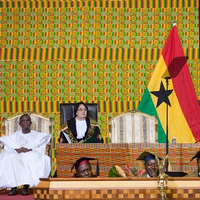Introduction
In recent years, Ghana has made impressive progress with regards to socio-economic and political development. This has lead to contemporary Western media and international donors portraying the country not merely as a success story, but as a model for Africa. While some elections in Africa have been followed by violent conflicts and other political struggles, Ghana has held five relatively peaceful and successful national elections between 1992 and 2008, including two that resulted in an alternation of power between parties. In particular, to the extent that the ruling New Patriotic Party (NPP) lost the December 2008 presidential election by a margin of less than 0.5 percent of the votes and still handed over power peacefully to the opposition National Democratic Congress (NDC), "Ghana . . . became an example to the rest of Africa, and the world, on successful democratic practice."
Beyond successful multiparty elections, Ghana's rankings on political rights, civil liberties and press freedom are among the best in Africa, with the 2008 Freedom House indicators of press freedom placing Ghana at the same level as Greece and Israel, and second out of 48 African countries. In addition to its maturing democracy, Ghana's economic growth and poverty reduction figures also look impressive, with the country nearly halving its proportion of poor people between the early 1990s and the mid-2000s [1].

